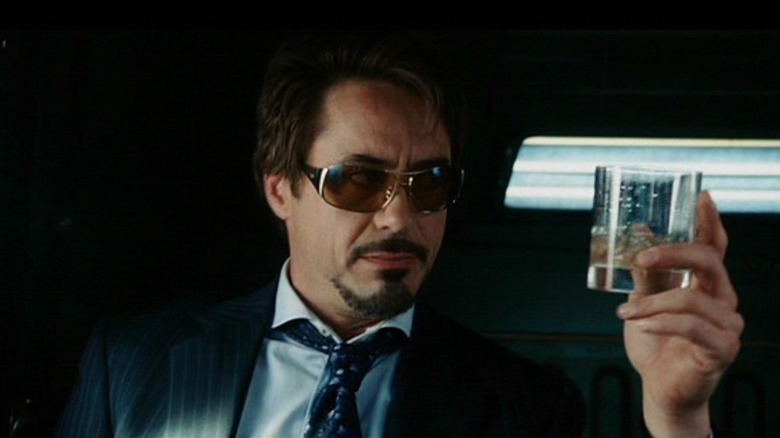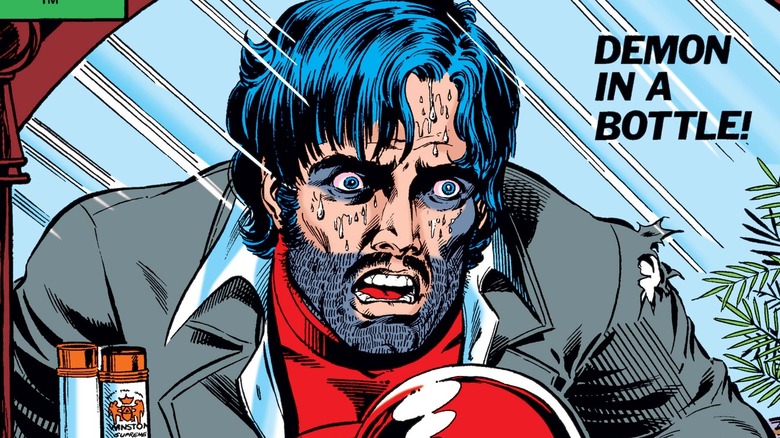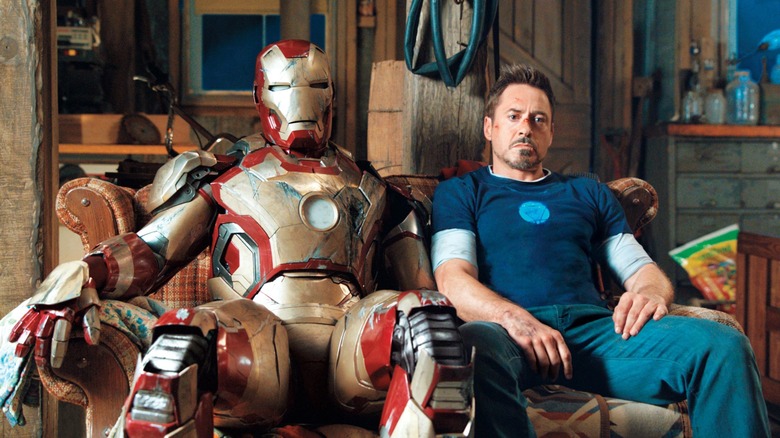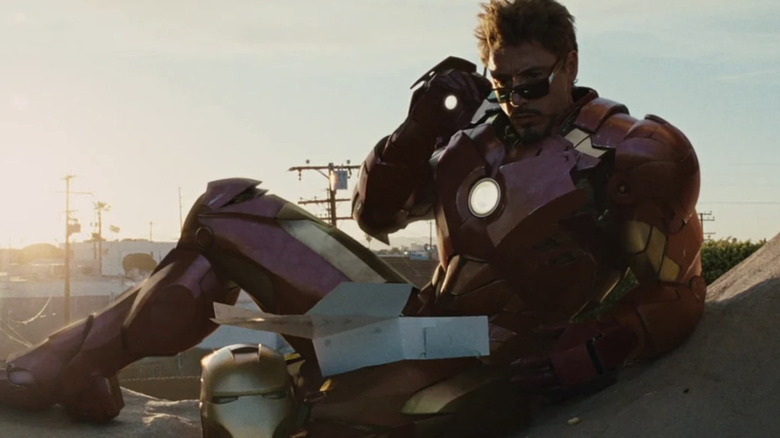The Dark Iron Man Sequel We'll Never Get To See
It's interesting to consider just how different the "Iron Man" sequels could've been had the filmmakers drawn more inspiration from a certain classic comics story — one that left Tony Stark forever changed.
"Iron Man" launched the Marvel Cinematic Universe in 2008 alongside "The Incredible Hulk," but we all know which one left a bigger impact. Robert Downey Jr.'s turn as Tony Stark was much more successful than Edward Norton's brief time as Bruce Banner and a sequel was rushed into production. "Iron Man 2" came out in 2010 and though the performances were strong, there was no saving this lackluster outing, even though it was a commercial hit. It may not be the only unpopular sequel, but Marvel seems to have learned from their mistakes with this film in terms of not making movies if you can't really justify their existence.
With that in mind, let's take a look at the darker version we didn't and will now never see.
Demon In A Bottle
"Demon in a Bottle" is a 1979 Iron Man comics story by David Michelinie, Bob Layton, John Romita Jr., and Carmine Infantino that had major ramifications for the Armored Avenger. While the story highlights Tony having a drinking problem, the actual narrative treats his increasingly worrisome consumption of booze mostly as background for much of the narrative. He is shown to be struggling, but it isn't until the final issue that his world truly crumbles around him. This works though, since alcoholism isn't always the obvious culprit. As is often the case, Tony was highly functional ... until he wasn't. Though it wrapped a little too neatly by modern standards, this plot point has had a lasting impact on Tony Stark, whose ongoing battle with alcohol has been well-documented in the comics since. In fact, after a couple of minor hiccups, Tony was sober for many years, but it wasn't always easy. He later sacrificed his sobriety as tribute to Odin (the world was at stake) in the "Fear Itself" storyline in 2011, but did eventually find his way back to sobriety.
While some fans hoped "Demon in a Bottle" would be explored in "Iron Man 2," writer Justin Theroux told UGO (via MTV) that he intentionally stayed away from the story, saying:
"It's just a great, gritty storyline. It doesn't transfer to film. We didn't want to be the 'Leaving Las Vegas' version of 'Iron Man 2.' Even just a little bit of that can completely dominate the story."
"Iron Man 2" does contain a few elements of "Demon in a Bottle," namely Justin Hammer (Sam Rockwell) and Whiplash (Mickey Rourke), though all the latter shares with his comic counterpart is his supervillain moniker. While the film does show a drunken Tony reaching a low point, the similarities pretty much end there. Theroux explained:
"We have [Tony Stark] drinking in the movie. We have him out of control. We have the self-destructive ticking clock... That's how we landed on his illness, that it's the metaphor for a man who's running out of steam and needs his friends to step up. Whereas, if we ran right toward the 'Demon in the Bottle' story, nobody wants to see Tony like that."
Theroux also noted that what can be done in a comic book panel would need an entire scene in a film and that "A 13-year old kid does not want to see drunken Tony."
Iron Man 3 Took Tony In A Different Direction
It does seem like Marvel could've potentially been building towards the "Demon in a Bottle" storyline, considering Tony's obvious propensity for drinking in the first two "Iron Man" films. However, "Iron Man 2" was released shortly after Disney bought Marvel and "Iron Man 3" didn't hit theaters until 2013. Tony's love of booze isn't a factor in "Iron Man 3" and when director Shane Black and writer Drew Pearce were asked what the studio wanted them to nix, Black said they were told not to include Tony's drinking. He explained:
"I think we were just told by the studio that we should probably paint Tony Stark as being kind of an industrialist and a crazy guy, or even a bad guy at some points, but the 'Demon in a Bottle' stuff of him being an alcoholic wouldn't really fly. I don't blame that."
Black also pointed out that as far as villains go, alcoholism isn't very cinematic. The filmmaker also told CBR:
"No, because if we go there — it's part of Tony's character, but I think the 'Demon In A Bottle' aspect, if you go there, you really have to go there. The film then becomes about that, because the journey that involves recovering from alcoholism is an entire movie. I mean, I want to keep it dark and interesting and edgy and spicy and all those things, but I don't think we want to go as far as to deal with Tony's descent into alcoholic madness. That's maybe not where we want to be."
Indeed, "Iron Man 3" chose to explore Tony's post-"Avengers" trauma rather than leaning into him drinking too much. It was a decision that only served to continue Tony's growth across the films that followed. I know it's a divisive MCU entry, but I personally love the movie.
Would Demon In A Bottle Have Made For A Better Sequel?
I may not be a huge fan of "Iron Man 2" and although I do feel "Demon in a Bottle" is a defining story for Tony Stark, it is probably for the best the MCU chose to take him in a different direction. Marvel has used its films and TV shows to explore real world issues with varying degrees of success and just as the original story wrapped up Tony's struggles a bit too easily (though still groundbreaking for the time), I feel the MCU would've done the same. Addiction is an incredibly important topic that needs a great deal of time and attention, and MCU films are already stuffed to the brim — sometimes overwhelmingly so. "Iron Man 2" was rushed and plagued by behind-the-scenes squabbles, which didn't make for a great movie, but "Demon in a Bottle" would've been a looming specter from which Tony never could've never escaped. It would've irrevocably altered his arc and possibly changed where the MCU ultimately headed in Phase 3.
The comics have had decades to deal with the ramifications of "Demon in a Bottle" and while most MCU characters have substantial arcs that show tremendous growth across their respective films and group efforts (a pretty impressive feat), there was simply no room to tell this story properly. Honestly, this version of Tony has a very satisfying arc without it.



